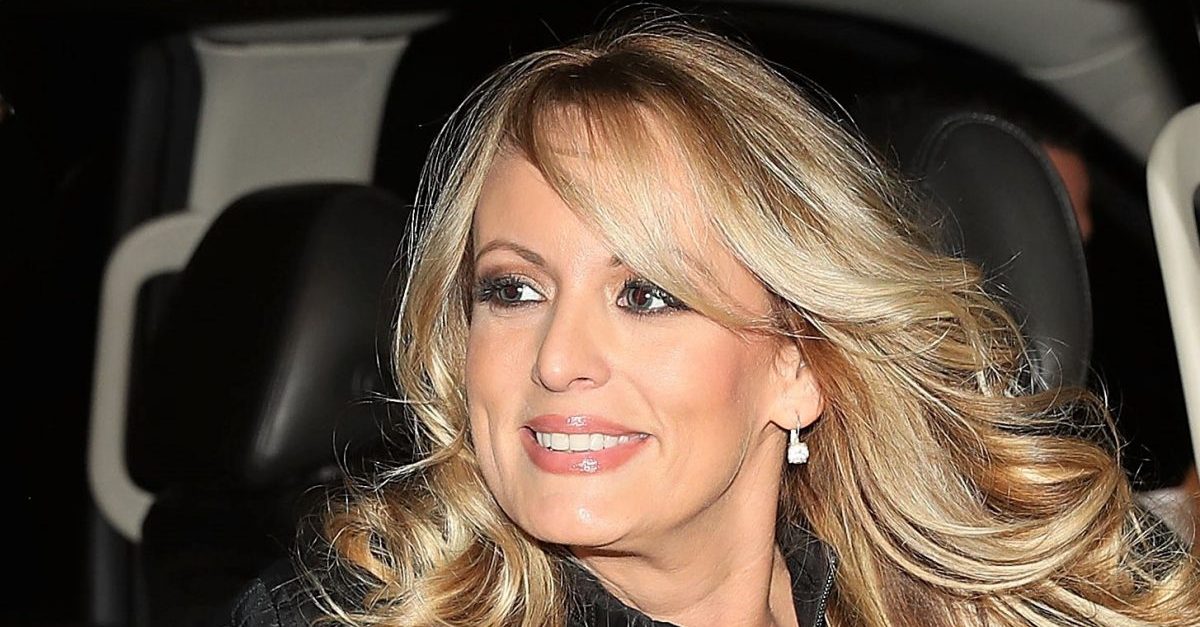
Stormy Daniels just filed her second lawsuit against President Donald Trump, and like her first one over her hush agreement, this complaint has some merit, but also some big problems (or as the defendant would say “yuge”) .
A sketch years later about a nonexistent man. A total con job, playing the Fake News Media for Fools (but they know it)! https://t.co/9Is7mHBFda
— Donald J. Trump (@realDonaldTrump) April 18, 2018
Daniels claims that Trump defamed her with a tweet that called her forensic sketch of a man who allegedly threatened her a “con job.” She has said that in 2011 when she first gave a magazine interview about an affair she allegedly had with Trump, an unknown man approached her and her child and made her fear for her safety.
The lawsuit says that by calling Daniels’ sketch–which she and attorney Michael Avenatti presented on The View–a “con job,” he’s calling her a liar who cannot be trusted, harming her reputation. That’s not a bad argument, but there are definitely issues that keep it from being a slam dunk.
In order to support a defamation claim, a person must show that the defendant made a statement to a third party that was false, defamatory, and in the case of a public figure (which Daniels likely is, given that the tweet was about her television appearance regarding a widely publicized story, plus she’s a porn star) there must have been knowledge that the statement was false, or at least reckless disregard for whether it was true.
Let’s assume for the sake of argument that Daniels was telling the truth about the alleged threat and was honest in her presentation of the sketch. That would make Trump’s statement false, but he’d have to have known it was false or not cared if it was true in order to be held liable. Daniels would have to prove that Trump knew that she had been threatened. If Trump can show that he asked his associates about it and they denied it, he’d likely be in the clear. If he didn’t know if the threat took place and never bothered to find out, Daniels would have a stronger argument.
Despite this, however, attorney Mark Zaid noted a greater difficulty that Daniels could face; specifically, the fact that the president could enjoy immunity regarding statements he makes in the scope of his employment.
Let’s hope they can get past WestFall Act immunity, which will be vey difficult. If court decides president was acting in scope of employment (broadly interpreted), full immunity attaches.
— Mark S. Zaid (@MarkSZaidEsq) April 30, 2018
While the lawsuit and Trump’s tweet are not exactly related to his actions as president, he has stated that he uses it as a method of directly communicating with the American people, without the filter of the media. His critics have even accused him of violating Twitter users’ First Amendment rights by blocking them from seeing his posts. That being said, it’s possible that a broad interpretation of “scope of employment” would protect him, even if Daniels would otherwise have had a strong argument.
Then there’s Daniels’ second argument, which claims that Trump’s statement was defamation per se (meaning she doesn’t have to prove damage) because it accused her of a criminal act. That act, according to the lawsuit, is falsely accusing someone of committing a crime against her. Of course, Daniels never named the individual who allegedly threatened her, which would likely make it tough to argue this point. The complaint claims that making such an accusation is a violation of New York law, but does not specify any particular statute.
When pressed on the issue, Daniels’ lawyer Michael Avenatti told Law&Crime, “It states New York law as well as numerous other states. It also is per se defamation under another prong of the common law. We can also plead special damages if required. So the case will proceed.”
All things considered, the biggest obstacle in the case for Daniels appears to be the immunity issue. While the defamation per se argument appears to be on the weak side, if a judge rules that Trump is not immune, the general argument that Trump defamed Daniels by calling her a liar could hold up.
That being said, these issues may remain unsettled for quite some time. While the Clinton v. Jones case made it clear that a sitting president can face a lawsuit while in office, it did say that courts have discretion in whether or not to delay cases until after a president’s term is up. If the court in this case does not feel a defamation claim is worth interfering with Trump’s duties as president, the case could be put on hold for the time being.
[Image via Joe Raedle/Getty Images)]